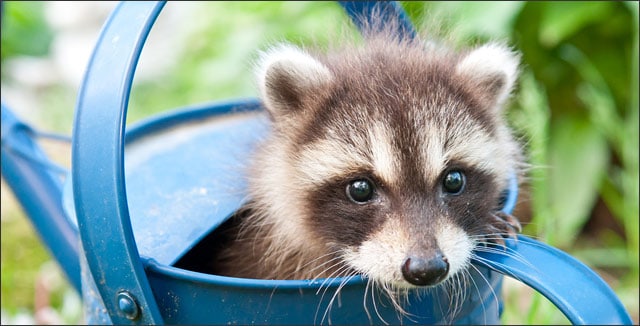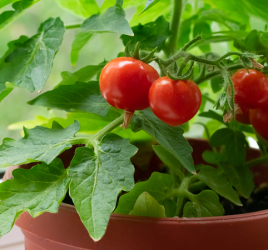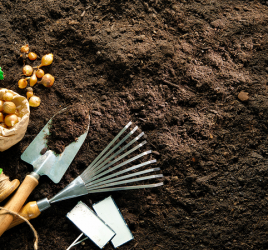How to Protect Your Garden From Predators Naturally

The first time I decided to add corn to my home garden, I was so excited. I had visions of warm summer nights eating dinner outside with fresh corn on our plates. I planted those seeds with great expectations. Hours were spent watering, weeding, and maintaining them.
As the corn began to grow, the joy of harvesting was mounting until one afternoon. I looked out our kitchen window and saw a squirrel peeling and chowing down on my home grown sweet corn. I was furious – all that work only to have my vegetable eaten by a squirrel.
I am sure I am not the only one with a story like this. There are a ton of different animals and pests that attack gardens all the time. Maybe you have started a garden only to have a similar experience and so you gave up trying. If you start a home garden, the last thing you want is for a pesky rabbit or deer taking out all your hard work and energy. If you grow the fruit and vegetables, it should be you that gets to enjoy them.
5 Natural Ways to Protect Your Garden From Predators
Here are five different and natural ways to help protect your garden from animals and pests.
- Plant in Raised Beds
Planting your garden in a raised bed may be one of the simplest ways to protect your garden. This can be especially helpful when you have little critters invading your space. With minimal effort, a raised garden bed can deter animals like rabbits, or gophers. It’s hard to know exactly what is attacking your plants. It might not be as obvious as it was for me catching that squirrel red handed. Having a raised bed helps not just protect your garden from mammals, but also insects. Have you had any problem with slugs? Raised beds will be a great protection from any crawling pests – including slugs.If you have never worked with a raised garden bed, you will find that they are essentially a container garden. You are using a larger container instead of many different pots. Building a raised bed can be easy. Your local garden store will even have ready to make options for you. Using wood for raised beds is just one option. You can use stone, bricks, concrete blocks, bales of hay, or even sand bags. Getting creative with your garden only adds to the personal touch and fun of the whole experience.
Using a raised bed method also has many other benefits. One in particular is the ability to regulate the quality of your soil, and have an easier time spacing your plants. When using a raised bed, you can also fit more plants a little bit closer getting more bang for your buck.
- Put in a Fence
Adding a fence to your garden is another simple and highly effective way of protecting your garden. When you put in fence, you are adding another layer of protection. While a raised bed can help protect from the little critters, larger animals will be able to lean over and enjoy your hard work. One of the most complained about animal from gardeners are deer. Constructing a well-designed and sturdy fence will be a great way to keep deer out. A good fence can also keep out the little critters like rabbits, as long as you make sure there are on openings that they can slip through.A few notes of advice when building a fence. One is to make sure you leave space from your fence and your plants. I had a row of amazing sugar snap peas that got leveled by an animal that ate through the spaces of my fence. In addition, make sure to place the fence about 4-6 inches into the ground so that a gopher or rabbit cannot dig under the fence.
- Use Plants as Natural Deterrents
A classic natural and beautiful addition to a garden is the marigold. These bright yellow or orange flowers make for a great natural deterrent in your garden. Marigolds put off a smell that rabbits can’t stand. Not only are they pretty and deter animals, you will find that marigolds have many benefits such as: anti-inflammatory, antibiotics, anti-aging, and even helps prevent cancer. Having marigolds in your garden is must have and will make a beautiful border.Another plant that deer and rabbits dislike are daisies and poppies. You can add these beautiful flowers as a border around your garden. Another option is to plant a thorny or prickly plant like cardoon or sedum to deter animals.
- Birds of Prey
Having a bird of prey around can be one of the best ways to protect your garden. This is a very natural way to protect your crops. Birds of prey will be happy to eat many of the pests in your area. When I realized the impact my local hawk can have on my garden, I looked forward to inviting him into my yard. One way that I invited birds of prey was by making sure there were koi fish in our koi pond. While this might be bad news of my koi and gold fish, it was great news for my garden. I would see a hawk often perched on top of our koi pond waiting for a chance to grab one.If you don’t have a koi pond, you might have to go another route. By adding 20 -25 foot perches round your garden might be a great option. Hawks will find these to be excellent places to nest and will eat or at least scare away many of the little animals. Another option would be to try to lure in owls. This is a little bit more complex. You can create an owl house with specific dimension and an opening of the right size. This would be a fun activity to do with your children too. How much fun would it be to have an owl live in your back yard? It would certainly help your garden too.
- Use Garden Fabric or Row Covers
Adding a raised bed, fence, other plants, and having a hawk nearby are great choices, but there are other pests that can still get to your garden. If you find that you are still having a lot of problems try going with a garden fabric. This will be best for protecting against frost, but it is also effective in blocking insects, birds, and also from the intense heat. It is very easy to use as you drape the cover over the garden plants or use hoops or frame to hold it up, almost creating a little tent.
Take Away
Whatever method you choose to use, making sure to keep pests and animals out of your garden is important. You don’t want all your hard work to go to waste. You should be able to enjoy the amazing fruit and vegetables that you created.
Your Turn
We would love to hear your thoughts. What pest or animal are you finding the most troublesome in your garden? What methods have you used that were effective in deterring them? Are any of these options new to



